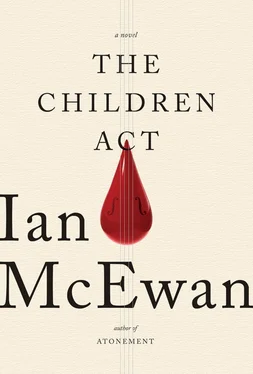I can’t work out what to make of this. Was it a fraud? It was a turning point for me. I’m cutting a long story short. When they brought me home I moved the Bible out of my room, I symbolically put it out in the hall facedown on a chair and I told my parents that I won’t be going near Kingdom Hall again, and they can disassociate me all they like. We’ve had some terrible rows. Mr. Crosby has been round to talk sense into me. No chance. I’ve been writing to you because I really needed to talk to you, I need to hear your calm voice and have your clear mind discuss this with me. I feel you’ve brought me close to something else, something really beautiful and deep, but I don’t really know what it is. You never told me what you believed in, but I loved it when you came and sat with me and we did “The Salley Gardens.” I still look at that poem every day. I love being “young and foolish” and if it wasn’t for you I’d be neither, I’d be dead! I wrote you lots of stupid letters and I think about you all the time and really want to see you and talk again. I daydream about us, impossible wonderful fantasies, like we go on a journey together round the world in a ship and we have cabins next door to each other and we walk up and down on the deck talking all day.
My Lady, will you please write to me, just a few words to say that you’ve read this letter and that you don’t hate me for writing it?
Yours, Adam Henry
PS I forgot to say that I’m getting stronger all the time.
She did not reply, or rather, she did not post the note it took her almost an hour that evening to compose. In her fourth and final draft she thought she was friendly enough, glad to learn that he was home and feeling better, pleased that he had good memories of her visit. She advised him to be loving toward his parents. It was normal in one’s teenage years to question the beliefs one had grown up with, but one should do it in a respectful manner. She finished by saying, although it was not true, that she had been “tickled” by the idea of the boat trip round the world. She added that when she was young, she’d had dreams of escape just like his own. This wasn’t true either, for she had been too ambitious, even at sixteen, too hungry for good grades on her essays to think of running off. Teenage visits to her Newcastle cousins had been her only adventures. When she looked at her short letter a day later, it wasn’t the friendliness that struck her, it was the coolness, the dud advice, the threefold impersonal use of “one,” the manufactured recollection. She reread his and was touched again by its innocence and warmth. Better to send nothing at all than cast him down. If she changed her mind, she could write later.
The time was approaching when she would be on circuit, visiting English cities and the old Assize towns in the company of another judge, whose field was criminal and civil law. She would hear cases that otherwise would need to travel to the law courts in London. She would stay in specially maintained lodgings, impressive townhouses of historical and architectural interest where, in certain cases, the cellars were legendary and the housekeeper was likely to be a decent cook. It was customary to be invited to a dinner given by the high sheriff. Then she and her fellow judge would return the compliment at the lodgings and invite notable or interesting types (there was a distinction) from the locality. The bedrooms were far grander than her own, the beds wider, the sheets of finer weave. In happier days, there was, for a securely married woman, guilty and sensuous pleasure in such unshared accommodation. Now, she longed to be gone from the silent and solemn pas de deux at home. And first stop was her favorite English city.
One morning in early September, a week before she began her journey, she received a second letter. Her concern was greater this time, even before she opened it, for the blue envelope lay on the doormat in the hallway at home, along with circulars and an electricity bill. No address, only her name. Easy enough for Adam Henry to wait outside in the Strand or in Carey Street and follow her at a distance.
Jack had already left for work. She took the letter into the kitchen and sat down with the remains of her breakfast.
My Lady,
I don’t even know what I wrote because I didn’t keep a copy but it’s okay that you didn’t reply. I still need to talk to you. Here’s my news—big rows with my parents, fantastic to be back at school, feeling better, feeling happy and then sad and then happy again. Sometimes the idea of having a stranger’s blood inside me makes me sick, like drinking someone’s saliva. Or worse. I can’t get rid of the idea that transfusion is wrong but I don’t care anymore. I’ve got so many questions for you but I’m not even sure you remember me. You must have had dozens of cases since me and loads of choices you’ve had to make about other people. I feel jealous! I wanted to talk to you in the street, come up and tap you on the shoulder. I couldn’t do it because I’m a coward. I thought you might not recognize me. You don’t have to reply to this one either—which means I wish you would. Please don’t worry, I’m not wanting to harass you or anything like that. I just feel the top of my head has exploded. All kinds of things are coming out!
Yours sincerely, Adam Henry
Immediately, she e-mailed Marina Greene to ask if she could find time, as a matter of routine follow-up, to visit the boy and report back. By the end of the day she had a reply. Marina had met Adam that afternoon at his school, where he was starting an extra term to prepare for exams before Christmas. She spent half an hour with him. He had put on weight, there was color in his cheeks. He was lively, even “funny and mischievous.” There was some trouble at home, mostly over religious differences with his parents, but she thought there was nothing unusual in that. Separately, the headmaster told her that Adam had done well in his time after hospital to catch up with his essays. His teachers thought he was turning in excellent work. Contributing well in class, no behavioral issues. All in all, it had turned out well. Reassured, Fiona decided against writing to him.
A week later, on the Monday morning she was to leave for the northeast of England, there occurred a minuscule shift along the marital fault lines, a movement as near-imperceptible as continental drift. It was unspoken, unacknowledged. Later, when she was on the train, thinking it through, the moment appeared to straddle the borders of the real and the imagined. Could she trust her recollection? It was seven thirty when she had come into the kitchen. Jack was standing by the counter with his back to her, pouring beans into the grinder. Her suitcase was in the hall and she was preoccupied with gathering up a few last documents. As usual, she was reluctant to be in a confined space with him. She picked up a scarf from the back of a chair and left to continue her search in the sitting room.
Some minutes later she came back. He was taking a jug of milk from the microwave. They were particular about their morning coffee and over the years their tastes had converged. They liked it strong, in tall white thin-lipped cups, filtered from high-grade Colombian beans, with warmed, not hot, milk. Still with his back to her, he poured milk into his coffee, then he turned with the raised cup only slightly extended toward her. There was nothing in his expression to suggest he was offering it to her, and she didn’t shake or nod her head. Their eyes met briefly. Then he set the cup down on the deal table and pushed it an inch or so toward her. In itself, this need not have meant much at all, for in their tense prowling around each other they remained pointedly courteous, as though each was trying to outdo the other in appearing reasonable, blamelessly above rancor. It would not have done to make a pot of coffee only large enough for oneself. But there are ways of setting down a cup on a table, from the peremptory clip of china on wood to a sensitive noiseless positing, and there are ways of accepting a cup, which she did smoothly, in slow motion, and after she had taken one sip she didn’t wander off, or not immediately, as she might have on any other morning. A few silent seconds passed, and then it seemed that this was as far as they were prepared to go, that the moment contained too much for them and to attempt more would have set them back. He turned away from her to reach a cup for himself, and she turned away from him to go and fetch something from the bedroom. They moved a little more slowly than usual, perhaps even reluctantly.
Читать дальше












